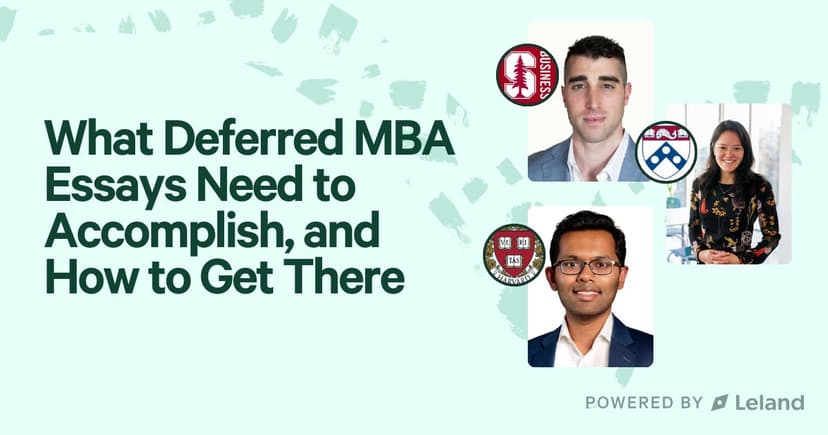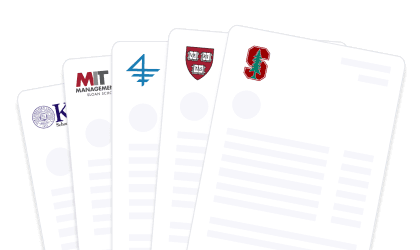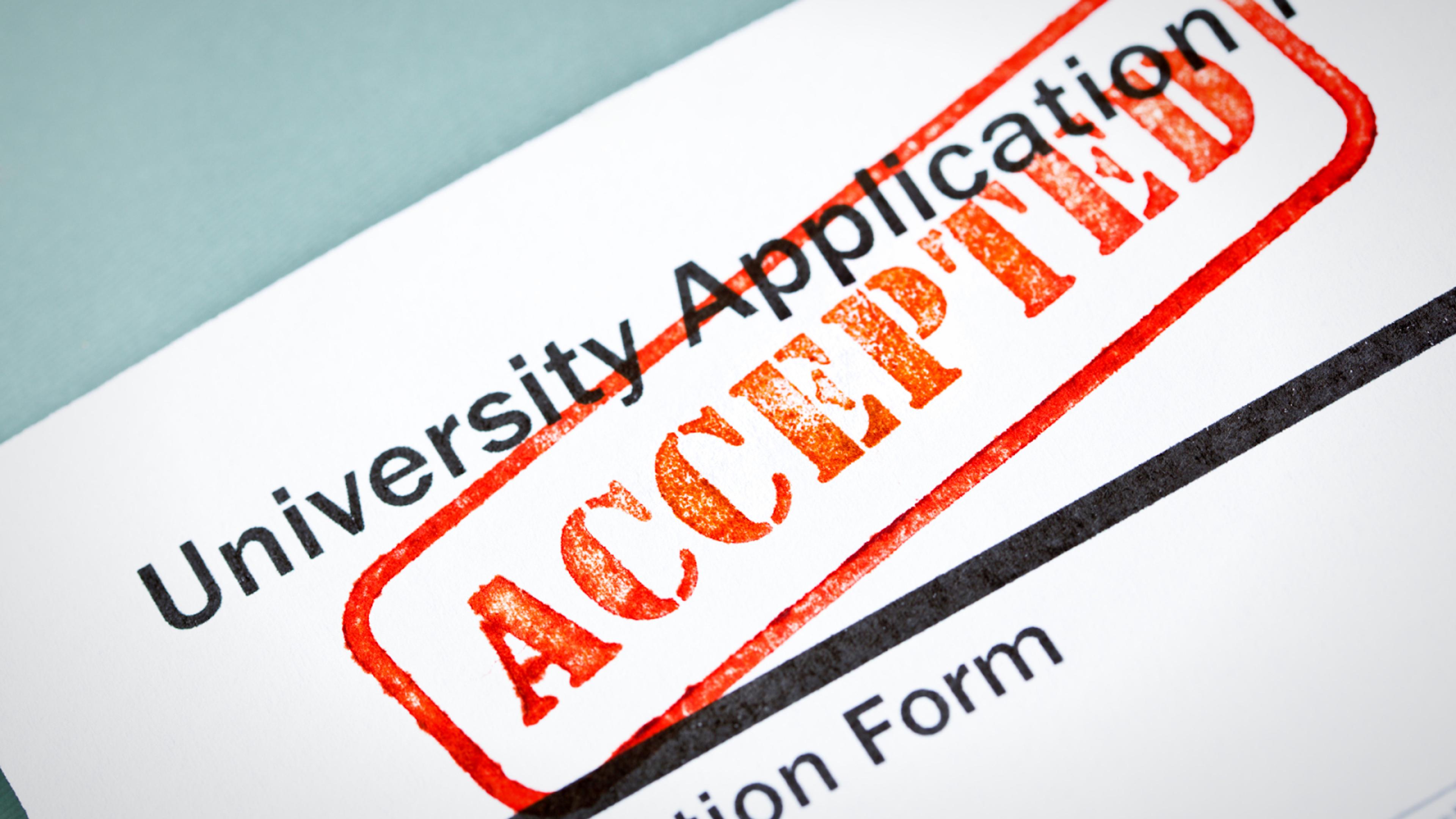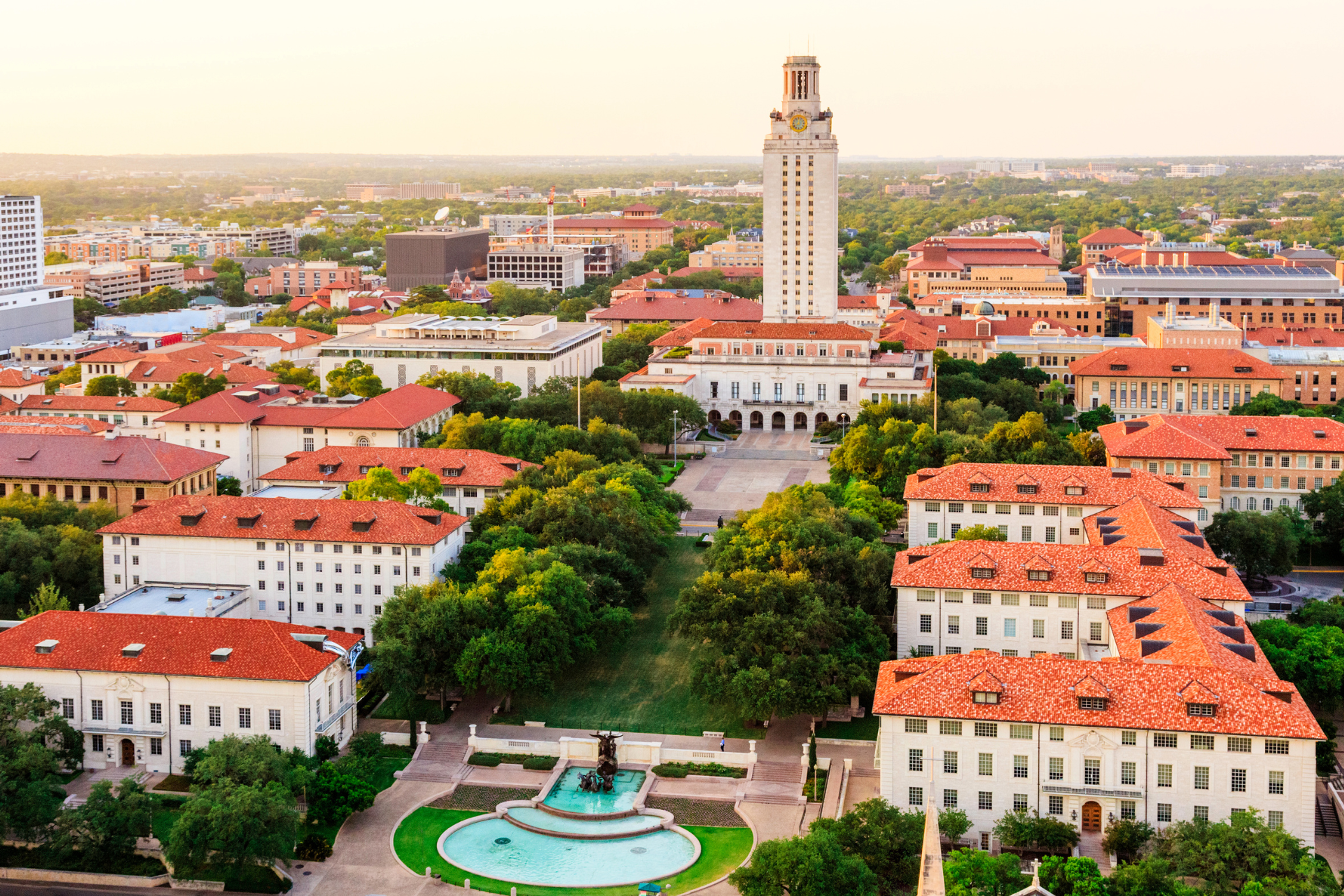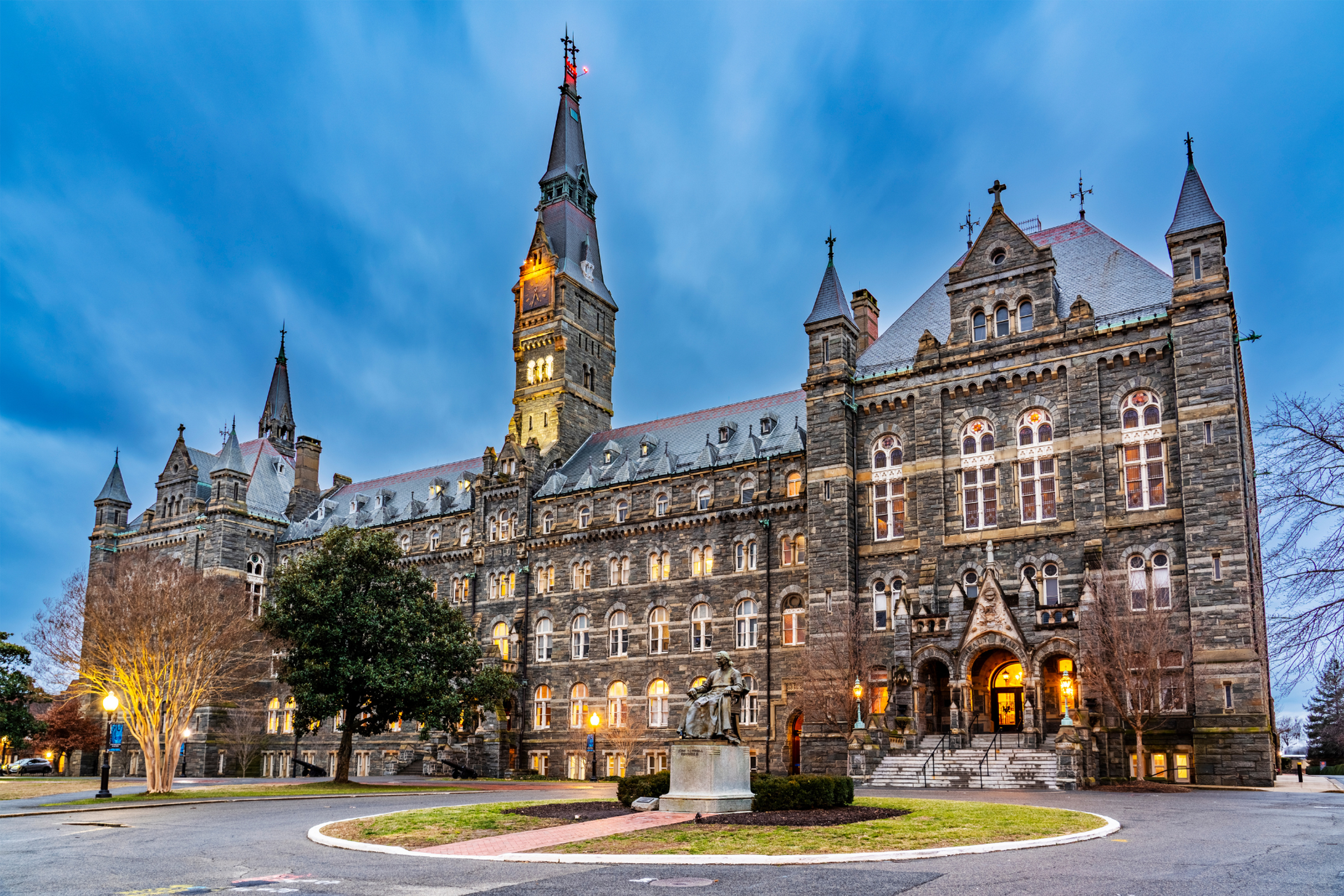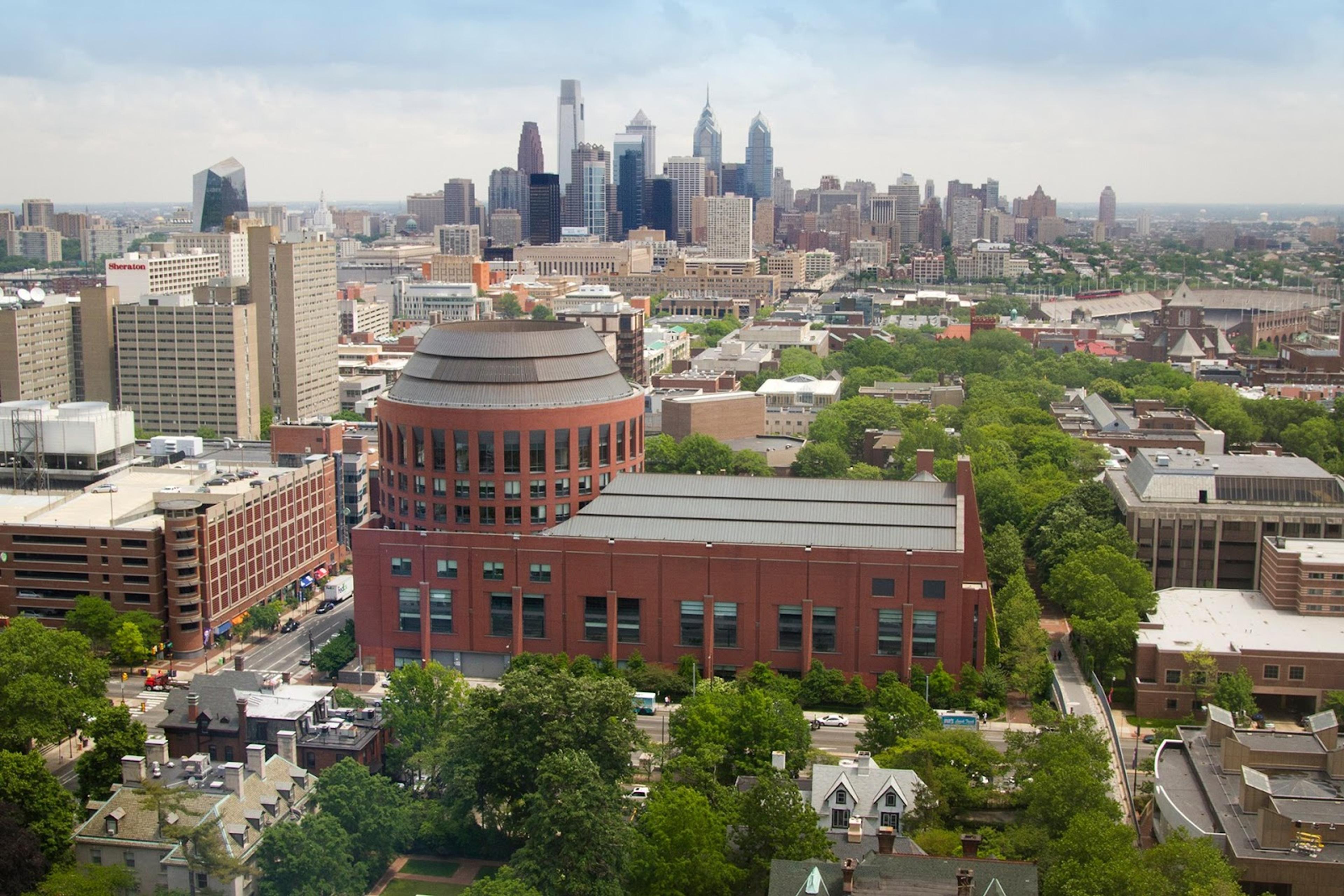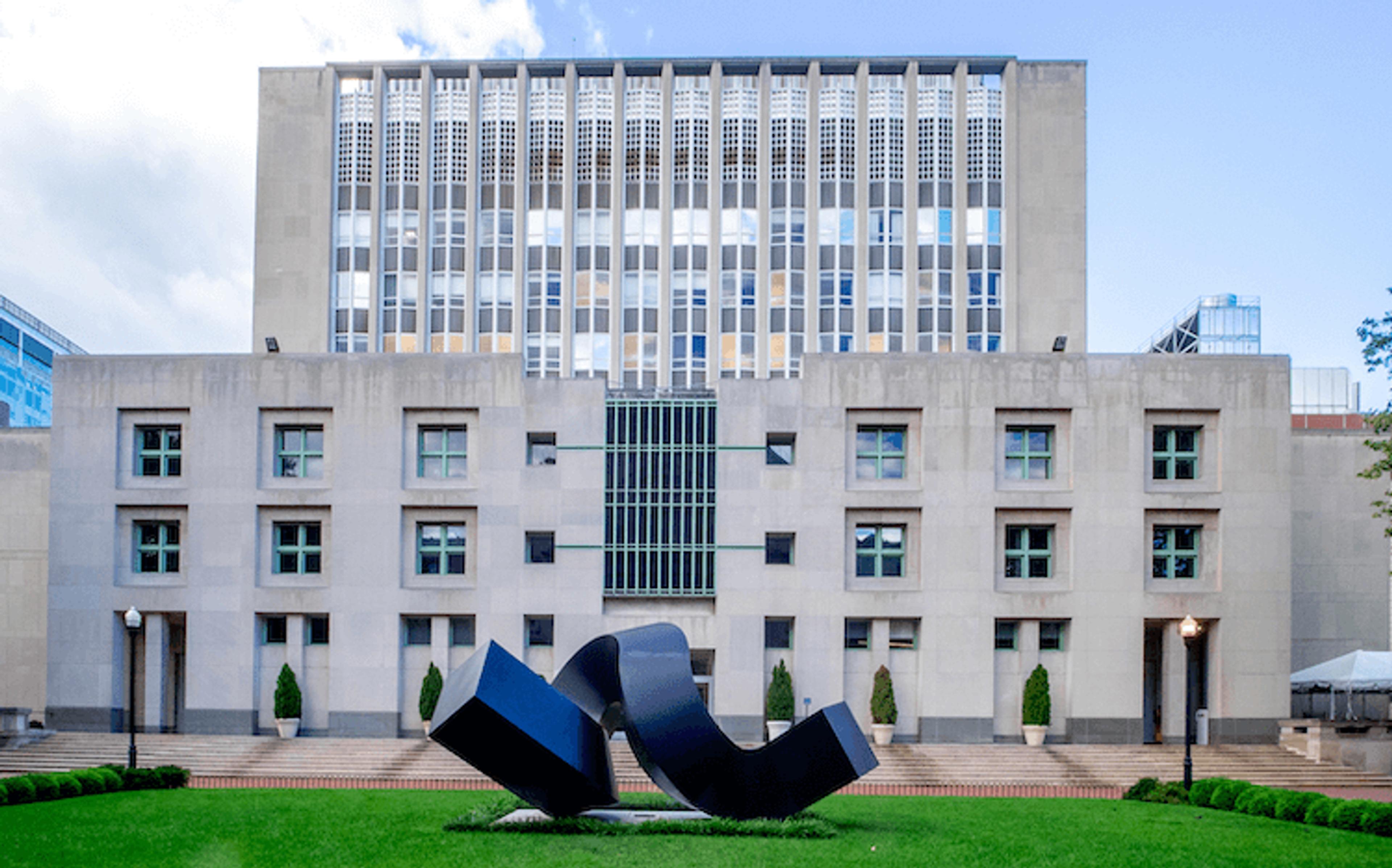
Join a free event
Learn from top coaches and industry experts in live, interactive sessions you can join for free.
Table of Contents
Columbia MBA Program Overview (2025)
Founded in 1916, Columbia Business School (CBS) is one of the most prestigious business schools in the world. Columbia Business School's comprehensive application process, innovative class structure, and special programs set it apart as a leader in business education. Located in New York City, CBS offers students unparalleled access to global business leaders, financial institutions, and a dynamic entrepreneurial ecosystem. The school is part of Columbia University, a member of the Ivy League, and is widely recognized for its rigorous academics, influential faculty, and diverse, high-achieving student body. Columbia’s MBA program includes key metrics and factors such as average GRE and GMAT scores, minimum work experience, tuition costs, application deadlines, and acceptance rates.
Columbia Business School’s MBA program is designed for ambitious professionals seeking a transformative experience that prepares them for leadership roles in finance, consulting, technology, entrepreneurship, and other industries. The school emphasizes real-world application of business concepts, offering a curriculum that blends theoretical foundations with practical experience. With a flexible and customizable curriculum, CBS enables students to tailor their education to their career goals. The program is supported by various academic divisions, which contribute to the diverse academic offerings and structure. The new Manhattanville campus features David Geffen Hall, a key building with technologically advanced classrooms and multifunctional spaces.
What Is the Columbia MBA Acceptance Rate in 2025?
For the 2023–2024 application cycle, Columbia Business School received 7,487 applications and enrolled 972 students in its full-time MBA program. Many applicants are drawn to Columbia Business School each year, reflecting its popularity and competitiveness. This includes both the August and January Term (J-Term) entries. Based on available data, the estimated Columbia MBA acceptance rate ranges from 16% to 22%.
Columbia MBA Class of 2026
| Metric | Value |
|---|---|
| Applications Received | 7,487 |
| Students Enrolled | 972 (734 Aug / 238 Jan) |
| Estimated Acceptance Rate | ~16–22% |
| Average GMAT | 732 |
| Average GRE Score | 162 Verbal / 162 Quant |
| Average Undergraduate GPA | 3.6 |
| Average Work Experience | 5 years |
CBS's MBA class is known for its diverse backgrounds, with students coming from a wide range of undergraduate universities and professional experiences.
For more information, visit the Columbia MBA Class Profile
Who Gets Into Columbia's MBA Program?
Academic and Professional Backgrounds
Columbia Business School students bring strong academic credentials and real-world experience. Most admitted students have a bachelor’s degree in fields such as business, economics, or engineering. A bachelor's degree or equivalent is a standard requirement for admission to CBS's MBA program.
Undergraduate Majors of CBS’s MBA Class:
- Business: 30%
- Economics: 18%
- Engineering: 16%
- Social Sciences: 13%
- Humanities, Sciences, Tech: remaining percentage
Pre-MBA Industries:
- Financial Services: 30%
- Consulting: 25%
- Technology: 13%
- Media/Marketing: 10%
- Healthcare, Government, Public Affairs: smaller percentages
Demographics
- Women: 44%
- International Students: 46%
- U.S. Minorities: 44%
Columbia's MBA class is known for its diversity, representing a wide range of backgrounds, experiences, and perspectives.
Note: Columbia Business School values a collaborative learning environment. CBS students come from different parts of the business world and contribute unique insights to the school’s MBA class.
Columbia MBA Admissions Rounds and Application Process
Columbia’s MBA program used to offer rolling admissions. Starting in 2023, the school switched to defined admissions rounds.
August Entry Deadlines:
- Round 1: Early September
- Round 2: Early January
- Round 3: Late March
January Term Deadlines:
- Round 1: June
- Round 2: Early September
Applicants interested in a dual degree program should review the separate application requirements and deadlines for those programs.
Note: CBS encourages candidates to apply early, especially if they want to be considered for merit fellowships.
Required Application Materials
- Application form
- Application fee
- Resume
- Admissions essays
- GMAT, GRE, or Executive Assessment scores
- Transcripts from all schools attended
- One letter of recommendation
- Proof of a bachelor's degree
Learn more on Columbia’s official site →
Note: Interviews are by invitation only and may be conducted by alumni, current students, or members of the admissions committee. Interviews are available in person or through virtual events.
How to Get Into Columbia Business School
1. Build a Strong Academic Profile
A strong GMAT or GRE score and a competitive undergraduate GPA are essential for demonstrating academic ability at Columbia Business School. The average GMAT score for CBS students is 732, with a range between 600 and 780, while average GRE scores are 162 in both Verbal and Quantitative sections. Columbia also accepts the GMAT Focus Edition and the Executive Assessment (EA), offering flexibility for applicants with different testing backgrounds. The average undergraduate GPA among admitted students is 3.6, though there is no official cutoff. However, applicants are expected to showcase strong academic performance – especially in quantitative coursework.
For those with a GPA below the average, CBS encourages strengthening academic readiness by completing supplemental quantitative courses, such as financial accounting or business analytics. These can help demonstrate your ability to handle the rigor of an MBA program. Additionally, international applicants with three-year undergraduate degrees may still be considered, as Columbia reviews these cases individually. Overall, a solid academic profile – bolstered by test scores, coursework, and transcripts – is a critical part of a competitive application.
2. Have Clear, Well-Defined Career Goals
Columbia Business School looks for applicants who can clearly explain how an MBA will support their professional trajectory. Successful candidates articulate both their short-term goals, specifying the industry and function they plan to enter immediately after graduation as well as their long-term vision, and showing how CBS is an essential part of that path. It’s important to demonstrate a deep understanding of your chosen industry and to be specific in your aspirations. Rather than offering general statements like “I want to work in consulting,” applicants should share targeted goals, such as joining McKinsey’s digital transformation practice to guide Fortune 500 companies through AI strategy. To strengthen your application, tie your goals directly to CBS’s offerings:
- Reference distinctive CBS resources, such as research centers, clubs, or global immersion programs
- Highlight professors whose work aligns with your interests
- Mention relevant electives or academic tracks (e.g., Value Investing, Private Equity, Real Estate)
- Emphasize how Columbia’s NYC location and network will support your goals
Example: “Columbia’s focus on Value Investing through the Heilbrunn Center aligns perfectly with my goal of managing a hedge fund.”
3. Demonstrate Leadership & Impact
Columbia prioritizes leadership and teamwork experience. Applicants must showcase moments where they:
- Led a team or project
- Drove measurable impact in an organization
- Demonstrated resilience and problem-solving skills
- Took initiative outside of their core job responsibilities
A professional development certificate program emphasizing business excellence can help individuals achieve personal and professional growth through customized learning paths, access to esteemed faculty, and a strong alumni network.
Strong leadership examples for your application:
- At Work: “Led a team of five to implement a new AI-driven pricing model, increasing company revenue by 15%.”
- In a Startup: “Founded an EdTech startup that reached 10,000 users within the first year.”
- In a Nonprofit: “Launched a mentorship program for underprivileged students, securing $50,000 in funding.”
Use quantifiable metrics in your essays and resume to showcase impact (e.g., revenue growth, team size, funding secured, efficiency improvements).
4. Engage with Columbia Business School
Columbia Business School values applicants who demonstrate genuine interest in the program and take proactive steps to engage with the community. Attending admissions events such as info sessions, webinars, MBA fairs, and on-campus visits shows initiative and curiosity.
Connecting with CBS alumni and current students through LinkedIn, Coffee Chats, or virtual meetups can offer valuable insights while signaling your commitment to understanding the school's culture. These interactions not only inform your application but also help build authentic connections with the CBS network.
In your essays, it’s essential to demonstrate fit by highlighting how Columbia’s offerings align with your goals. Go beyond generalities and reference specific programs, centers, or clubs – such as the Value Investing Program for finance-focused applicants or The Lang Center for Entrepreneurship for aspiring founders. Emphasize how CBS’s collaborative environment, academic strengths, and New York City location will uniquely support your development. Show that you're not just applying to a top MBA program, but to one whose community, resources, and mission are the right match for you.
5. Nail the Columbia MBA Interview
At Columbia Business School, interviews are conducted by invitation only, so receiving one is a strong signal that you’re being seriously considered for admission. Interviews are typically led by CBS alumni and are designed to assess your fit with the program, your clarity of purpose, and your potential to contribute to the CBS community. You can expect questions that explore your career goals, why you believe Columbia is the right fit, and how you’ve demonstrated leadership and teamwork in the past. Many questions follow a behavioral format, prompting you to reflect on real-life experiences and decision-making moments. To deliver clear and compelling responses, use the STAR Method (Situation, Task, Action, Result), which helps structure your answers and keep them focused.
Here are key themes to prepare for during your CBS interview:
- Career Goals: Be ready to explain your short- and long-term goals, and how CBS will help you achieve them.
- Why Columbia: Show specific knowledge of CBS’s offerings and how they align with your plans.
- Leadership Experience: Share examples where you led a team, made an impact, or influenced outcomes.
- Teamwork and Collaboration: Talk about times you worked with diverse groups and resolved challenges.
- Behavioral Questions: Prepare for prompts like “Tell me about a time you failed” or “Describe a conflict you resolved.”
- STAR Method Usage: Practice structuring responses to stay concise, insightful, and results-oriented.
6. Apply Early for a Competitive Advantage
Applying early to Columbia Business School can offer a significant advantage, especially given the school’s unique admissions structure. CBS uses rolling admissions for its January-entry MBA program, meaning applications are reviewed – and decisions are made – on a continual basis as they’re received. Because spots fill up as the cycle progresses, applying early can increase your chances of admission and scholarship consideration.
For the August-entry MBA program, Columbia follows a more traditional rounds-based admissions process, with set deadlines for each round. Submitting your application in an earlier round demonstrates enthusiasm, gives you a better shot at an interview invite, and ensures you're competing for seats before they begin to fill. Whether you're applying for January or August entry, getting your application in early shows initiative and can improve your chances in a competitive applicant pool.
The Columbia MBA Student Experience
Program Structure
Columbia offers two entry points:
- August Entry: Full-time 20-month MBA program
- January Term (J-Term): Accelerated 16-month MBA for those who are not seeking a summer internship or plan to return to their previous employers
CBS students take core courses during their first semester and join learning teams of about five students to complete assignments, emphasizing collaboration and a small-group experience. The program is structured around fall and spring semesters, with a summer internship for August-entry students.
Campus & Location
- CBS is located on the Manhattanville campus in New York City
- Proximity to Wall Street and global firms gives students access to industry leaders
Career Outcomes
- Median base salary: $175,000
- Top industries: Consulting (30.6%), Financial Services (35.9%), Technology (10%)
- Most full-time MBA students find roles in the U.S., with others working in Europe or Asia
Read: MBA Options and Deadlines
Columbia MBA Requirements
Application Checklist
1. Completed Online Application
All applicants must fill out Columbia Business School’s online application, which includes personal details, educational history, employment history, and short-answer questions. Columbia's MBA program requires applicants to provide details such as average GRE and GMAT scores, work experience requirements, and application deadlines. The average GMAT score for admitted students is 732, and the average GRE scores are 162 for both Verbal and Quantitative sections. Applicants should also note the application deadlines to ensure timely submission.
2. Academic Transcripts
- Candidates must provide transcripts from all undergraduate and graduate institutions attended.
- If a transcript is not in English, a certified translation must be included.
- Columbia does not require a specific GPA format; applicants should report their GPA as it appears on their official transcript.
- Those with a three-year undergraduate degree will be reviewed on a case-by-case basis.
3. Standardized Test Scores (GMAT, GRE, or Executive Assessment)
- CBS accepts GMAT, GRE, and Executive Assessment (EA) scores for the Full-Time MBA program.
- Applicants may submit the GMAT Focus Edition as well.
- Test scores must be valid for five years at the time of application submission.
- Self-reported scores are allowed for the initial application, but official scores must be submitted upon admission.
- Columbia’s test codes:
- GMAT/EA Code: QF8-N6-52
- GRE Code: 6442
Test Score Considerations:
- No minimum score is required, but competitive applicants generally score in the following range:
- GMAT: 600-780 (Average: 732)
- GRE Verbal: 146-170 (Average: 162)
- GRE Quantitative: 143-170 (Average: 162)
- Candidates cannot request a test score waiver.
4. One Letter of Recommendation
CBS requires only one recommendation letter, ideally from a current supervisor or someone who can provide insight into the applicant’s professional achievements and leadership skills.
- If an applicant cannot request a recommendation from a current supervisor, they must provide an explanation in the application.
- Recommenders should use a professional email address (personal emails are subject to additional verification).
- CBS may contact recommenders for verification, so applicants should notify them in advance.
5. Resume (One Page Preferred)
Applicants must submit a one-page professional resume that outlines their education, work experience, skills, and extracurricular activities.
- Full-time MBA applicants should focus on post-undergraduate work experience.
- Deferred Enrollment applicants can include internships and part-time work.
- Candidates should update their resume if they experience career changes during the admissions process.
6. Columbia Business School Essays
The essays provide applicants with the opportunity to showcase their career goals, leadership experience, and personal story.
Short-Answer Question (50 characters max)
- What is your immediate post-MBA professional goal?
Example: “Join a strategy consulting firm in NYC”
Essay 1 (300 words): Why do you feel Columbia Business School is a good fit for you?
This essay should connect Columbia’s resources, curriculum, and network to the applicant’s career goals. Strong responses include:
- Specific CBS professors, courses, or programs that align with professional ambitions.
- Mention of Columbia’s New York location and access to industries like finance, consulting, tech, or entrepreneurship.
- Discussion of leadership opportunities, student clubs, and global immersion programs.
Essay 2 (500 words): Tell us about a time you created value in a professional context.
This essay allows candidates to highlight their leadership, impact, and problem-solving abilities. Strong responses should:
- Provide a clear challenge or problem the applicant faced.
- Show specific actions taken to drive impact.
- Quantify results where possible (e.g., “Led a cost-reduction initiative that saved the company $1M annually”).
- Connect the experience to skills they plan to build at CBS.
Essay 3 (Optional): Is there anything else you would like to share?
This essay should only be used if:
- The applicant has unusual circumstances or gaps in their application (e.g., employment gaps, academic weaknesses).
- The applicant wants to highlight non-traditional experience, personal hardships, or diversity factors.
- If there’s nothing crucial to add, this essay can be skipped.
7. Application Fee: $250
- Columbia’s application fee is non-refundable.
- Deferred Enrollment applicants do not pay an application fee.
- Fee waivers are available for:
- Full-time students, active-duty military personnel, and Peace Corps/Teach for All members.
- Applicants facing financial hardship (proof of income may be required).
8. Interview (By Invitation Only)
- Interviews are not guaranteed and are invite-only based on the application review.
- Interviews are conducted by CBS alumni or admissions officers.
- They typically last 30-45 minutes and focus on:
- Motivation for an MBA
- Career goals and fit with Columbia
- Behavioral questions (e.g., leadership, teamwork, problem-solving)
Expert Tip: Candidates should research CBS thoroughly before the interview and prepare examples demonstrating their impact, leadership, and collaboration skills.
Read: MBA Application Requirements
Columbia MBA Core Curriculum & Class Structure
Year 1
- Core Curriculum:
- In the first year, students are grouped into clusters to take core courses together, providing a strong foundation in essential business disciplines. These core courses include Financial Accounting, Corporate Finance, Managerial Economics, Marketing Strategy, Operations Management, and Leadership & Organizational Change.
- Electives begin in the second semester.
Year 2
- Full Elective Schedule: Over 300 electives available.
- Opportunities: Study abroad, consulting projects, internships.
Columbia Business School Notable Alumni & Faculty
Notable Alumni
- Warren Buffett: CEO of Berkshire Hathaway, renowned investor, and philanthropist.
- Henry Kravis: Co-founder of Kohlberg Kravis Roberts & Co. (KKR), a global investment firm.
- Vikram Pandit: Former CEO of Citigroup, a leading global bank.
- Melinda Gates: Co-chair of the Bill & Melinda Gates Foundation, focusing on global health and education initiatives.
- Tarek Sherif: Chairman and CEO of Medidata Solutions, a leader in clinical trial technology.
- Nina Tandon: CEO and co-founder of EpiBone, a company pioneering bone tissue engineering.
- Josh Makower: Special partner at New Enterprise Associates, with a focus on medical devices and healthcare innovation.
Columbia Business School Faculty
- Joseph Stiglitz: Nobel Laureate in Economics, recognized for his work on information asymmetry and global economic policies.
- R. Glenn Hubbard: Former Dean of Columbia Business School and an authority on economic policy and public finance.
- Bruce Greenwald: Expert in value investing and economics, known for his insightful teachings and publications.
- Gita V. Johar: Meyer Feldberg Professor of Business, recognized for her research in consumer psychology and marketing strategies.
- Adam Galinsky: Paul Calello Professor of Leadership and Ethics, acclaimed for his work on leadership, negotiations, and decision-making.
- Lawrence R. Glosten: S. Sloan Colt Professor of Banking and International Finance, noted for his research in financial markets and microstructure.
- Adjunct Professors: Contributing to the teaching of classes alongside full-time faculty and executives in residence, showcasing a diverse faculty composition.
Ready to Get Into Your Dream MBA Program?
Applying to Columbia Business School, or any top MBA program, takes more than strong stats. It requires a clear narrative, thoughtful career goals, and a compelling case for fit. Whether you’re polishing your essays, preparing for interviews, or deciding which round to target, expert guidance can make all the difference.
Here are three of the most popular MBA admissions consultants for Columbia Business School.
- Victoria R.- Columbia MBA, Forte Fellow | Expert in essays, interviews, & school selection | 20+ CBS admits
- Melanie E. - Ex-McKinsey, CBS MBA | 100+ M7 admits | Former CBS MBA interviewer | Specializes in storytelling & leadership positioning
- London L.- Columbia MBA, Consortium Fellow | Former Accenture Consultant | Expert in career pivots, essays, & interviews
Still deciding? Explore top MBA admissions coaches on Leland and book a free intro call today to take the next step toward your dream MBA.
Related Articles:
For more resources as you apply to business school, check out these resources:
- Columbia MBA Employment Report – Key Insights & Takeaways
- Columbia Business School – PhD Program Overview
- Columbia MBA Majors: Real Estate, Healthcare, & More
- Columbia MBA Class Profile – Key Insights & Takeaways
- The Complete MBA Application Guide
- The 10 Best MBA Admissions Consultants
FAQs
Is Columbia Business School good for private equity?
- Yes, Columbia Business School is highly regarded for private equity. It offers a specialized Private Equity Program, a PE Club with over 700 members, and a strong alumni network in the industry. CBS's location in New York City also provides direct access to top private equity firms, internship opportunities, and industry events.
What are the private equity resources at Columbia Business School?
- Columbia offers extensive resources for aspiring private equity professionals, including the Private Equity Program, PE-focused electives, guest lectures, the Private Equity Fellows Program, and on-campus recruiting for top firms like Blackstone, KKR, and Carlyle.
Does Columbia have strong recruiting for private equity?
- Yes, Columbia Business School has strong on-campus recruiting for private equity, particularly for students with pre-MBA experience in investment banking or consulting. The school’s PE Club and alumni network also help students break into the industry through off-campus networking.
Do you need prior PE experience to get into private equity from CBS?
- While prior private equity experience helps, it's not required. Many CBS students transition from backgrounds in investment banking, management consulting, or corporate finance. The Private Equity Fellows Program and alumni connections help bridge the gap for career switchers.
How many Columbia MBA grads go into private equity?
- Approximately 5–10% of Columbia MBA graduates go into private equity each year. While the percentage is smaller than finance or consulting, the quality of PE placements is strong, with alumni at leading firms globally.
How does Columbia compare to other schools for private equity?
- Columbia ranks among the top U.S. business schools for private equity, along with HBS, Stanford, and Wharton. Its NYC location, PE curriculum, and access to top firms make it a strong choice for students targeting private equity careers.
Browse hundreds of expert coaches
Leland coaches have helped thousands of people achieve their goals. A dedicated mentor can make all the difference.




